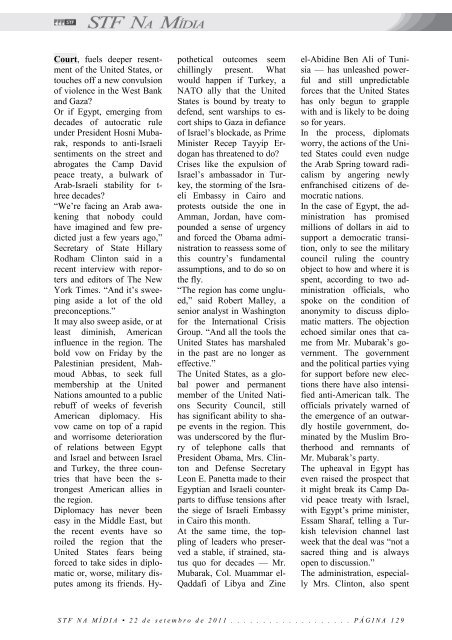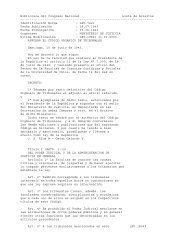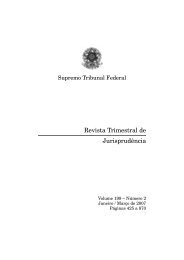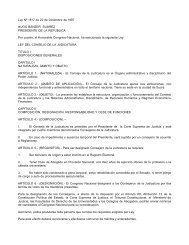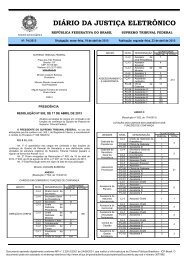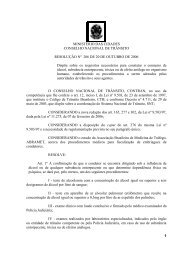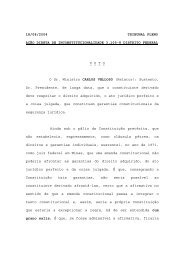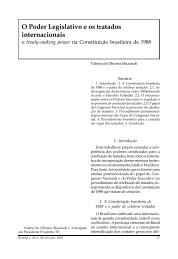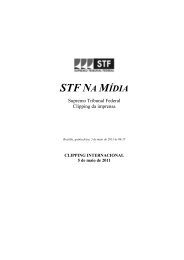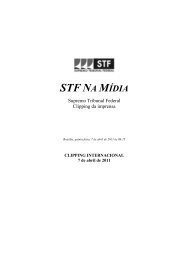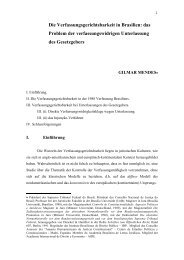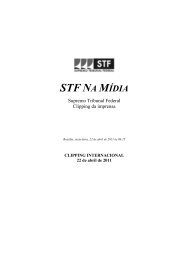STF NA MÍDIA
STF NA MÍDIA
STF NA MÍDIA
Create successful ePaper yourself
Turn your PDF publications into a flip-book with our unique Google optimized e-Paper software.
Court, fuels deeper resentment<br />
of the United States, or<br />
touches off a new convulsion<br />
of violence in the West Bank<br />
and Gaza?<br />
Or if Egypt, emerging from<br />
decades of autocratic rule<br />
under President Hosni Mubarak,<br />
responds to anti-Israeli<br />
sentiments on the street and<br />
abrogates the Camp David<br />
peace treaty, a bulwark of<br />
Arab-Israeli stability for t-<br />
hree decades?<br />
“We’re facing an Arab awakening<br />
that nobody could<br />
have imagined and few predicted<br />
just a few years ago,”<br />
Secretary of State Hillary<br />
Rodham Clinton said in a<br />
recent interview with reporters<br />
and editors of The New<br />
York Times. “And it’s sweeping<br />
aside a lot of the old<br />
preconceptions.”<br />
It may also sweep aside, or at<br />
least diminish, American<br />
influence in the region. The<br />
bold vow on Friday by the<br />
Palestinian president, Mahmoud<br />
Abbas, to seek full<br />
membership at the United<br />
Nations amounted to a public<br />
rebuff of weeks of feverish<br />
American diplomacy. His<br />
vow came on top of a rapid<br />
and worrisome deterioration<br />
of relations between Egypt<br />
and Israel and between Israel<br />
and Turkey, the three countries<br />
that have been the s-<br />
trongest American allies in<br />
the region.<br />
Diplomacy has never been<br />
easy in the Middle East, but<br />
the recent events have so<br />
roiled the region that the<br />
United States fears being<br />
forced to take sides in diplomatic<br />
or, worse, military disputes<br />
among its friends. Hypothetical<br />
outcomes seem<br />
chillingly present. What<br />
would happen if Turkey, a<br />
<strong>NA</strong>TO ally that the United<br />
States is bound by treaty to<br />
defend, sent warships to escort<br />
ships to Gaza in defiance<br />
of Israel’s blockade, as Prime<br />
Minister Recep Tayyip Erdogan<br />
has threatened to do?<br />
Crises like the expulsion of<br />
Israel’s ambassador in Turkey,<br />
the storming of the Israeli<br />
Embassy in Cairo and<br />
protests outside the one in<br />
Amman, Jordan, have compounded<br />
a sense of urgency<br />
and forced the Obama administration<br />
to reassess some of<br />
this country’s fundamental<br />
assumptions, and to do so on<br />
the fly.<br />
“The region has come unglued,”<br />
said Robert Malley, a<br />
senior analyst in Washington<br />
for the International Crisis<br />
Group. “And all the tools the<br />
United States has marshaled<br />
in the past are no longer as<br />
effective.”<br />
The United States, as a global<br />
power and permanent<br />
member of the United Nations<br />
Security Council, still<br />
has significant ability to shape<br />
events in the region. This<br />
was underscored by the flurry<br />
of telephone calls that<br />
President Obama, Mrs. Clinton<br />
and Defense Secretary<br />
Leon E. Panetta made to their<br />
Egyptian and Israeli counterparts<br />
to diffuse tensions after<br />
the siege of Israeli Embassy<br />
in Cairo this month.<br />
At the same time, the toppling<br />
of leaders who preserved<br />
a stable, if strained, status<br />
quo for decades — Mr.<br />
Mubarak, Col. Muammar el-<br />
Qaddafi of Libya and Zine<br />
el-Abidine Ben Ali of Tunisia<br />
— has unleashed powerful<br />
and still unpredictable<br />
forces that the United States<br />
has only begun to grapple<br />
with and is likely to be doing<br />
so for years.<br />
In the process, diplomats<br />
worry, the actions of the United<br />
States could even nudge<br />
the Arab Spring toward radicalism<br />
by angering newly<br />
enfranchised citizens of democratic<br />
nations.<br />
In the case of Egypt, the administration<br />
has promised<br />
millions of dollars in aid to<br />
support a democratic transition,<br />
only to see the military<br />
council ruling the country<br />
object to how and where it is<br />
spent, according to two administration<br />
officials, who<br />
spoke on the condition of<br />
anonymity to discuss diplomatic<br />
matters. The objection<br />
echoed similar ones that came<br />
from Mr. Mubarak’s government.<br />
The government<br />
and the political parties vying<br />
for support before new elections<br />
there have also intensified<br />
anti-American talk. The<br />
officials privately warned of<br />
the emergence of an outwardly<br />
hostile government, dominated<br />
by the Muslim Brotherhood<br />
and remnants of<br />
Mr. Mubarak’s party.<br />
The upheaval in Egypt has<br />
even raised the prospect that<br />
it might break its Camp David<br />
peace treaty with Israel,<br />
with Egypt’s prime minister,<br />
Essam Sharaf, telling a Turkish<br />
television channel last<br />
week that the deal was “not a<br />
sacred thing and is always<br />
open to discussion.”<br />
The administration, especially<br />
Mrs. Clinton, also spent<br />
S T F N A M Í D I A • 2 2 d e s e t e m b r o d e 2 0 1 1 . . . . . . . . . . . . . . . . . . . P Á G I N A 1 2 9


